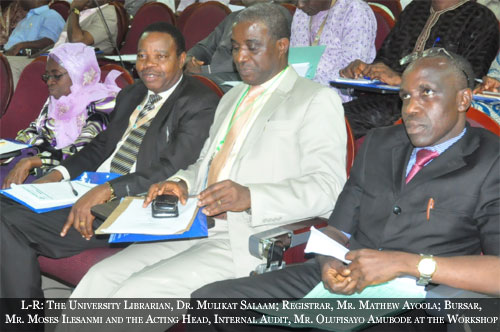 The University Bursar, Mr. Moses Ilesanmi, has charged government officials to comply with due process when requesting for or utilizing approved funds.
The University Bursar, Mr. Moses Ilesanmi, has charged government officials to comply with due process when requesting for or utilizing approved funds.
Mr. Ilesanmi stated this at the One-day Awareness Workshop, organised by the Bursary Department, which was aimed at educating spending officers on how to access available funds for the overall development of the University by getting acquitted with the official procedures. Speaking on the topic, “Essential Requirements for Fund Allocation and Utilization”, the Bursar stated that under the regulatory framework, it was a punishable offence to receive and disburse government money without financial authority. Explaining further, he defined financial authority as the legal instrument that empowers and guides public officers while carrying out official financial transactions.
The Bursar pointed out that while engaging in formal business transactions, public officers were to ensure that they complied with due process which involved “following the prescribed, generally known, agreed and accepted procedure or ways to do something. It could be legal provisions or moral standards”. He added that due diligence should be applied by “being careful to verify, ascertain and ensure that information presented or represented in support of any claim or position on a transaction by a customer or client is genuine, real and true”.
He highlighted some basic questions that spending officers should always remember such as: what do we need? Why do we need it? When do we need it? What is the cost? Where is it available? Are there alternatives? And, how do we get it? He further said, public officers, equipped with the necessary information, can then follow the following steps before making purchases: determine the need, ascertain cost, confirm funds availability, seek open and competitive quotations in line with procurement regulations, perform due diligence, prepare formal request of items and goods needed by stating vote of charge, secure approval in compliance with threshold, document duly-verified or certified items and goods received, process the received goods and items for payment, prepare payment voucher subject to all statutory deductions and being audited, and then effect payment using electronic payment.
He enumerated the accepted methods of transacting business to include the use of Local Purchase Order (LPO), payment of cash advance, request for re-imbursement and the use of ‘I Owe You’ (IOU). Mr. Ilesanmi charged spending officers to ensure that they do timely retirement of the cash spent.
In his presentation titled, “The Role of Internal Audit on Fund Utilisation”, the Acting Head, Internal Audit, Mr. Olufisayo Amubode, defined Audit as a systematic investigation and appraisal of transactions procedures, operations and financial statements, adding that the main purpose of audit was to ensure the determination of the degree of adherence to prescribed standards.
According to him, Internal Audit played a vital role in ensuring strict compliance to budget control procedures by ensuring that funds were utilised only for the purposes for which they were allocated in the budget. Mr. Amubode further highlighted the role of Internal Audit in funds allocation and utilisation through safeguarding of policies, ensuring of standards, price intelligence service, ensuring of efficiency and effectiveness, pre and post-payment audit, promoting financial discipline, monitoring, and making of recommendations. Others include the provision of alternative means and ways of implementing and utilising funds as approved, rendering assistance while prioritising programmes to achieve overall effectiveness and efficiency, and linking departmental activities with the relevant offices.
Mr. Amubode described as erroneous, the impression by people, that the Internal Audit was saddled with the sole responsibility of discovering fraud, saying the duties of the office covered reviewing and evaluating the activities of the institution with a view to expressing an opinion on the efficient and effective allocation and utilisation of funds by ensuring sound internal control mechanism within the University. He promised that the Directorate of Internal Audit of the University was committed to providing good services while imploring spending officers to always carry along his Directorate in the course of embarking on official purchases and expenditure.
Earlier, the Vice-Chancellor, Professor Olusola Oyewole, who was represented at the occasion by the Deputy Vice-Chancellor, Development, Professor Felix Salako, charged public officers to ensure that funds were always utilised for the purposes they were meant for, as they would eventually be held accountable for such official commitments.
Last Updated on July 12, 2015 by admin
